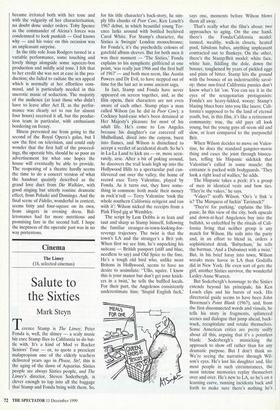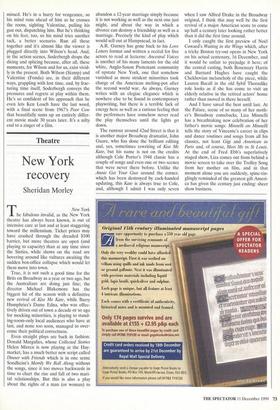Cinema
The Limey (18, selected cinemas)
Salute to the Sixties
Mark Steyn
Terence Stamp is The Limey; Peter Fonda is, well, the slimey — a scaly music biz exec Stamp flies to California to do bat- tle with. It's a kind of Mod vs Rocker Seniors' Tour — or, to quote a prescient malapropism one of the elderly teachers delivered years ago in Please, Sid, this is the aging of the dawn of Aquarius. Sixties people are always Sixties people, and The Limey's director, Steven Soderbergh, is clever enough to tap into all the baggage that Stamp and Fonda bring with them. So, for his title character's back-story, he sim- ply lifts chunks of Poor Cow, Ken Loach's 1967 debut, in which beautiful young Ter- ence larks around with bottled beehived Carol White. For Stamp's character, the Sixties is Swingin' London monochrome; for Fonda's, it's the psychedelic colours of gatefold album sleeves. But for both men it was their moment — 'The Sixties,' Fonda explains to his nymphette girlfriend at one point, 'was really just 1966 and the first half of 1967' — and both men seem, like Austin Powers and Dr Evil, to have stepped out of time for the last act in some ancient saga.
In fact, Stamp and Fonda have never appeared on screen together, and, as the film opens, their characters are not even aware of each other. Stamp plays a man called Wilson (as he did in Poor Cow), a Cockney hard-case who's been detained at Her Majesty's pleasure for most of his adult life. He's come to Los Angeles because his daughter's car careered off Mulholland, dived into the canyon, burst into flames, and Wilson is disinclined to accept a verdict of accidental death. So he's in La-La Land to kick ass — or, more accu- rately, arse. After a bit of poking around, he discovers the trail leads high up into the Hollywood Hills to a spectacular pad can- tilevered out over the valley, the home of record exec Terry Valentine, played by Fonda. As it turns out, they have some- thing in common: both made their money in rock'n'roll — Terry Valentine 'took the whole southern California zeitgeist and ran with it'; Wilson nicked the receipts from a Pink Floyd gig at Wembley.
The script by Lem Dobbs is as lean and taut and sharp as Stamp himself, following the familiar stranger-in-town-looking-for- revenge trajectory. The twist is that the town's LA and the stranger's a Brit yob. When first we see him, he's unpacking his suitcase — British passport (stiff and blue, needless to say) and Old Spice to the fore. He's a tough old bird who, unlike most Britons in Hollywood, seems to have no desire to assimilate: "Ullo, squire. I know this is your manor but don't get your knick- ers in a twist,' he tells the baffled locals. For their part, the Angelenos consistently underestimate him: 'Stupid English fuck,' says one, moments before Wilson blows them all away.
That's really what the film's about: two approaches to aging. On the one hand, there's the Fonda/California model: tanned, wealthy, walk-in closets, heated pool, fabulous babes, anything unpleasant contracted out to flunkeys. On the other, there's the Stamp/Brit model: white face, white hair, fiddling the dole, down the boozer, toughened by years of pickled eggs and pints of bitter. Stamp hits the ground with the bounce of an indestructible saval- oy: those sun-fried California pussies don't know what's hit 'em. You can see it in the eyes of the sexagenarian protagonists: Fonda's are heavy-lidded, woozy; Stamp's blazing blues bore into you like lasers. Cali- fornia's supposed to be the land of eternal youth, but, in this film, it's like a retirement community: true, the old guys all look young, but the young guys all seem old and slow, at least compared to the purposeful Brit.
When Wilson decides to move on Valen- tine, he does the standard gangster-movie thing and cases the joint through binocu- lars, telling his Hispanic sidekick that Valentine's called in some muscle: the entrance is packed with bodyguards. 'They look a right load of wallies,' he adds.
The Hispanic takes a peek: it's a group of men in identical vests and bow ties. 'They're the valays,' he says.
`Valays?' scoffs Wilson. 'Oo's 'e fink 'e is? The Marquess of fuckin' Tavistock?'
`They're for parking,' explains the His- panic. In this view of the city, both upscale and down-at-heel Angelenos buy into the bullshit, so enfeebled by the rituals of Cali- fornia living that neither group is any match for Wilson. He sails into the party and, in an effort to blend in, orders a sophisticated drink. `Babycham,' he tells the barman. 'And a Dubonnet with a twist.' But, in his brief foray into town, Wilson wreaks more havoc in LA than Godzilla did in New York. He even sort of gets the girl, another Sixties survivor, the wonderful Lesley-Anne Warren.
But Soderbergh's hommage to the Sixties extends beyond his principals, his Ken Loach clips and his bursts of rock. His directorial guide seems to have been John Boorman's Point Blank (1967), and, from the first disconnected words and visuals, he tells his story in fragments, splintered scenes and dialogue that jump ahead, back- track, recapitulate and retake themselves. Some American critics are pretty sniffy about all this, arguing that it's a pointless blank: Soderbergh's mimicking the approach to show off rather than for any dramatic purpose. But I don't think so. We're seeing the narrative through Wil- son's eyes. He's lost his daughter and, like most people in such circumstances, the most intense memories replay themselves over and over. He's new to LA, so he's on a learning curve, running incidents back and forth to make sure there's nothing he's
missed. He's in a hurry for vengeance, so his mind runs ahead of him as he crosses the room, sighting Valentine, pulling his gun out, dispatching him. But he's thinking on his feet, too, so his mind tries another tack, a better scenario. Run all these together and it's almost like the viewer is plugged directly into Wilson's head, And, in the action scenes, Soderbergh drops the dicing and splicing because, after all, these moments, for Wilson and for us, exist vivid- ly in the present. Both Wilson (Stamp) and Valentine (Fonda) are, in their different ways, grappling with lost time, and, by frac- turing time itself, Soderbergh conveys the pressures and regrets at play within them. He's so confident of his approach that he even lets Ken Loach have the last word, with a final scene from 1967's Poor Cow that beautifully sums up an entirely differ- ent movie made 30 years later. It's a nifty end to a zinger of a film.



























































































 Previous page
Previous page